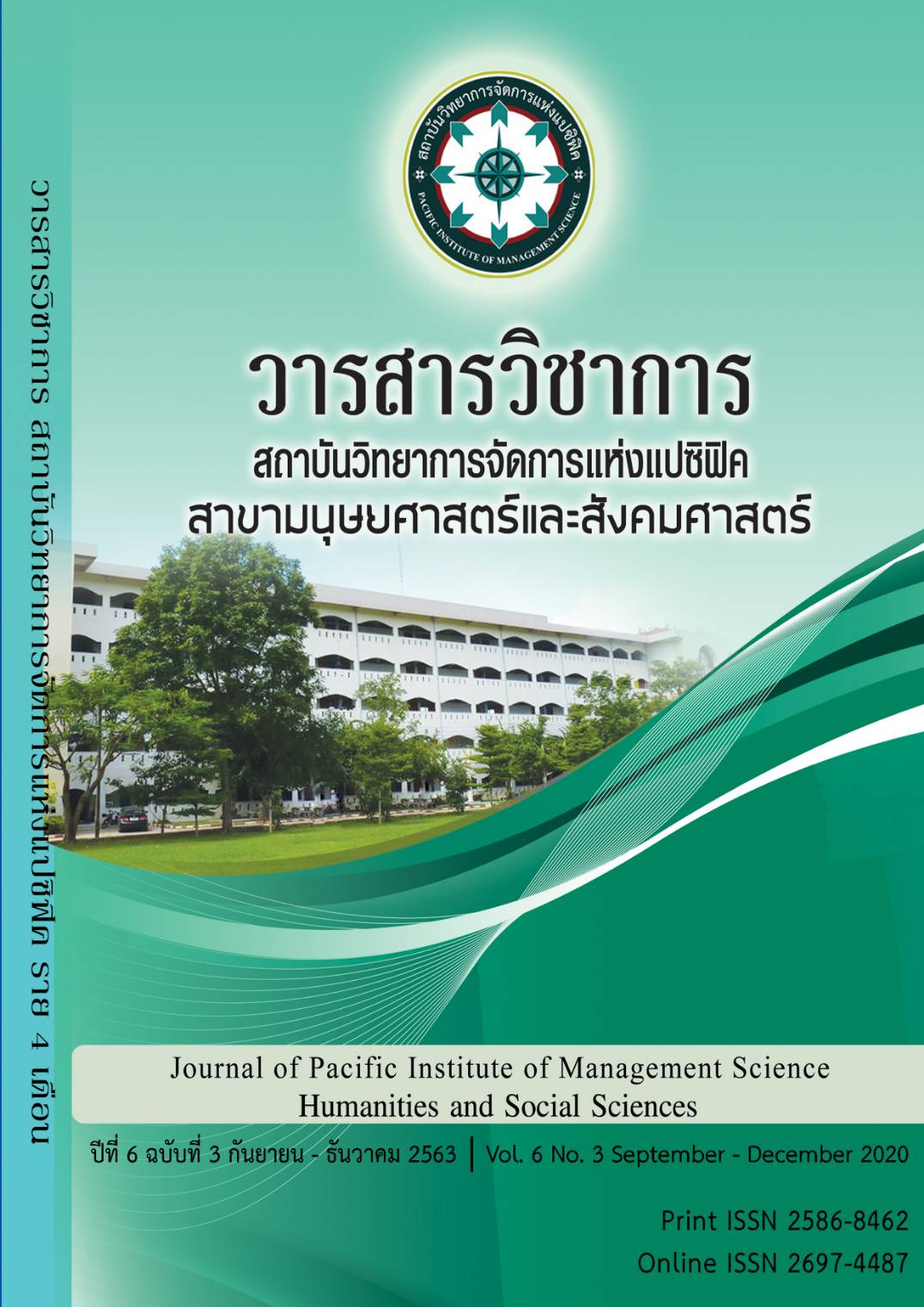THE BODY OF KNOWLEDGE IN PSYCHOLOGY FOR SECONDARY SCHOOL ADMINISTRATION
Keywords:
body of knowledge in psychology, secondary school administrationAbstract
The purposes of this research were 1) to identify the body of knowledge in psychology for secondary school administration and 2) verify the body of knowledge in psychology for secondary school administration. The sample were 97 basic education schools, determined by Taro Yamane sample size table at the confidence level of 90%.
The respondents were a school director, the deputy director of personnel and guidance teacher with a total of 291 respondents. The research instruments were the
semi-structured interview, the questionnaire about the body of knowledge in psychology for secondary school administration and the confirmatory form. The statistics used to analyze the data were frequency, percentage, arithmetic mean, standard deviation, confirmatory factor analysis, and content analysis. The research findings revealed that:
- The body of knowledge in psychology for secondary school administration were composed of 16 factors : 1) General psychology 2) Guidance psychology 3) Counseling psychology 4) Buddhism psychology 5) Experimental psychology 6) Learning psychology
7) Educational psychology 8) Personality psychology 9) Clinical psychology 10) Crowd psychology or Mob psychology 11) Abnormal psychology 12) Community psychology 13) Industrial and organization psychology 14) Development psychology 15) Social psychology and 16) Parapsychology. - The body of knowledge in psychology for secondary school administration were verified with accuracy, propriety, feasibility, and utility.
References
กล้าหาญ ณ น่าน. อิทธิพลของคุณลักษณะบุคลิกภาพ และความพึงพอใจที ต่อการปรับตัวในการทำงานของผู้เข้าสู่ตลาดบัณฑิตใหม่. วารสารวิทยาการจัดการ. ปีที่ 31 ฉบับที่ 1: 39-67, 2558.
ชูศักดิ์ เจนประโคน. เทคนิคการสร้างแรงจูงใจ. กรุงเทพฯ: สานักพิมพ์ มหาวิทยาลัยรามคำแหง, 2550.
ชมพูนุท ศรีจันทร์นิล. จิตวิทยาแนวพุทธ: แนวทางเพื่อการเยียวยา และพัฒนาจิตใจมนุษย์. วารสารวิชาการ มหาวิทยาลัยหอการค้าไทย. ปีที่ 29 ฉบับที่ 4 เดือนตุลาคม - ธันวาคม 2552, 2552.
พิพัฒน์ สุยะ. ธรรมชาติของมนุษย์: ความยุติธรรมปะทะอำนาจ – มิเชล ฟูโกต์กับนอม ชอมสกี้สนทนา.วารสารอักษรศาสตร์
พนม ลิ้มอารีย์. การแนะแนวเบื้องต้น. กรุงเทพฯ: โอเดียนสโตร์, 2548.
พระมนตรี อินตา. การแนะแนวชีวิตผ่านนัยเปรียบของพระพุทธเจ้าในนิทานชาดก. วิทยานิพนธ์ปริญญามหาบัณฑิต สาขาวิชาจิตวิทยาการศึกษาและการแนะแนวบัณฑิตวิทยาลัยมหาวิทยาลัยเชียงใหม่, 2552.
น้ำทิพย์ งามสุทธา. การพัฒนารูปแบบการเรียนรู้บูรณาการแนวคิดจิตวิทยาร่วมสมัยเพื่อสร้างเสริมจิตสาธารณะนักเรียนมัธยมศึกษาตอนต้น. วารสารกลุ่มสาขามนุษยศาสตร์และสังคมศาสตร์.ชลบุรี : มหาวิทยาลัยศรีปทุม วิทยาเขตชลบุรี, 2554.
บริบูรณ์ ศรีมาชัย. แบบจำลองสมการโครงสร้างปัจจัยที่มีอิทธิพลต่อ พฤติกรรมการมีส่วนร่วมของผู้สูงอายุในกิจกรรมชุมชน เขตจตุจักร กรุงเทพมหานคร. วารสารสมาคมนักวิจัย. ปีที่ 9 ฉบับที่ 1, 2557.
ธีระพร อุวรรณโณ. Social psychology: จิตวิทยาสังคม. สารานุกรมจิตวิทยาฉบับราชบัณฑิตสภา. กรุงเทพฯ: ราชบัณฑิตสภา, 2560.
ธนัชพร โมราวงษ์. ปัจจัยทางจิตวิทยาองค์การที่มีอิทธิพลต่อการนำไปสู่องค์การ แห่งความเป็นเลิศ: กรณีศึกษาโรงงานในเขตนิคมอุตสาหกรรมบางปู จังหวัดสมุทรปราการ. หลักสูตรวิทยาศาสตรมหาบัณฑิต บัณฑิตวิทยาลัย, มหาวิทยาลัยรามคำแหง, 2555.
สันติ กิจลือเกียรติ. การศึกษาเชิงทดลองกระบวนการเรียนรู้ที่ผสมผสานระหว่างการเรียนรู้แบบร่วมมือกับการเรียนรู้โดยใช้ผังกราฟิก เพื่อเสริมสร้างทักษะการคิดอย่างมีวิจารณญาณของนักเรียนชั้นประถมศึกษาปีที่ 6 โรงเรียนวิภารัตน์ จังหวัดปทุมธานี. ศึกษาศาสตรดุษฎีบัณฑิต คณะศึกษาศาสตร์ บัณฑิตวิทยาลัย มหาวิทยาลัยรังสิต, 2555.
ศรัญญา อิชิดะ. การศึกษาพฤติกรรมความรุนแรงของนักเรียนวัยรุ่น. หลักสูตรปริญญาการศึกษามหาบัณฑิต บัณฑิตวิทยาลัย, มหาวิทยาลัยศรีนครินทรวิโรฒ, 2553.
อภิวัฒน์ สมาธิ. การดำเนินนโยบายของรัฐภายใต้การบังคับใช้กฎอัยการศึกในสามจังหวัดชายแดนภาคใต้. หลักสูตรปรัชญาดุษฎีบัณฑิต บัณฑิตวิทยาลัย, มหาวิทยาลัยอีสเทิร์นเอเชีย, 2554.
อวยชัย จาตุรพันธ์. การใช้อำนาจของผู้บริหารกับบรรยากาศองค์การของสถานศึกษา สังกัดสำนักงานเขตพื้นที่การศึกษาสมุทรสาคร. วิทยานิพนธ์ปริญญามหาบัณฑิต มหาวิทยาลัยศิลปากร, 2554.
Alexander,M.F. ICN Framework of Competencies for the Generalist Nurse : Report of the Development Process and Consultation. Geneva : Switzerland, 2003.
K.B. Everard and Geoffery Morris. (1985). Effective School Management. London: Harper and row Publishers, 3-6
Daniel Desta, Desalegn Chalchisa and Girma Lemma. School-based continuous Teacher Professional Development in Addis Ababa: An Investigation of Practices, Opportunities and Challenges. Journal of International Cooperation in Education, Vol.15 No.3, 2013.
Goodwin, W.L. and Herbert L.K. An Introduction to Educational Psychology. New York: Harper & Row, Publishers.: 213, 1975.
Gustavo, Wilehes-Chaux. The meaning is Participation : Community Participation :Proceeding. Columbia : Habinet, 1992.
Henderson, P., & Gysbers, N.C. Leading & managing your school guidance program staff. Alexandria, VA: American Counseling Association, 1998.
Hjelle, Larry A. and Daniel Ziegler J. Personality Theories: Basic Assumption Research and Application. Auckland : MacGraw-Hill, 1992.
Maslow, Abraham. Motivation and Personality. New York : Harper and Row Publishers, 1970.
Murphy, N. & McVey, D. Treating Personality Disorder Creating Robust Services for People with Complex Mental Health Needs. London: Routledge, 2010.
Sullivan .E. J., & Phillip J. D. Effective Leadership and Management in Nursing. New Jersey: Prentice Hall, 1997.
Ubben, G. C & Hughes, L. W. The principal: Creative Leadership for Effective Schools. Boston: Allyn and Bacon, 1987.
Downloads
Published
Issue
Section
License
บทความที่ได้รับการตีพิมพ์เป็นลิขสิทธิ์ของ สถาบันวิทยาการจัดการแห่งแปซิฟิค
ข้อความที่ปรากฏในบทความแต่ละเรื่องในวารสารวิชาการเล่มนี้เป็นความคิดเห็นส่วนตัวของผู้เขียนแต่ละท่านไม่เกี่ยวข้องกับสถาบันวิทยาการจัดการแห่งแปซิฟิค และคณาจารย์ท่านอื่นๆในสถาบันฯ แต่อย่างใด ความรับผิดชอบองค์ประกอบทั้งหมดของบทความแต่ละเรื่องเป็นของผู้เขียนแต่ละท่าน หากมีความผิดพลาดใดๆ ผู้เขียนแต่ละท่านจะรับผิดชอบบทความของตนเองแต่ผู้เดียว







